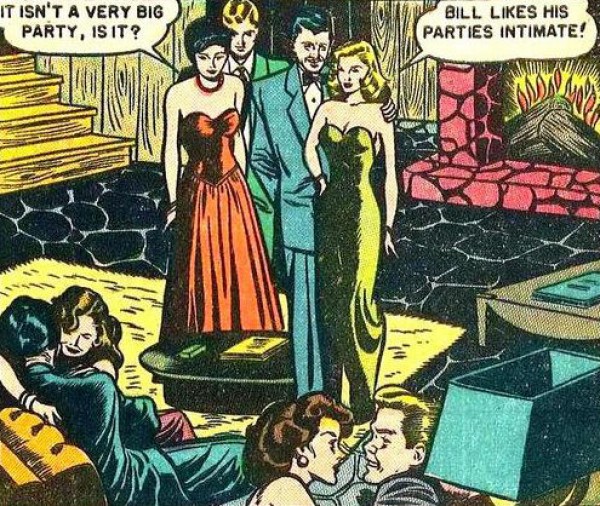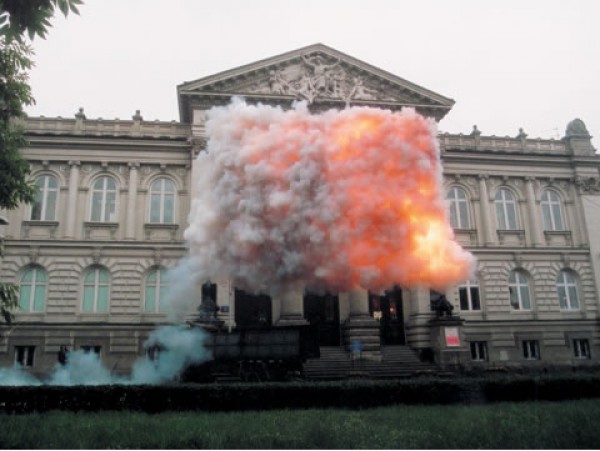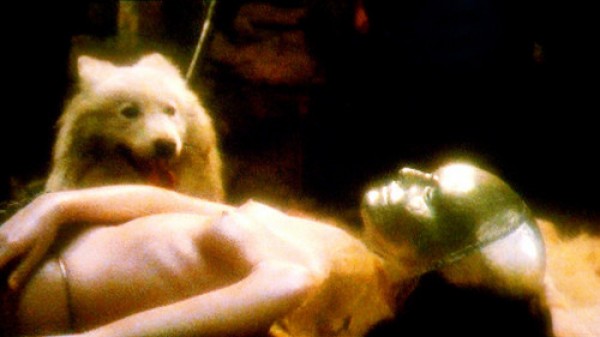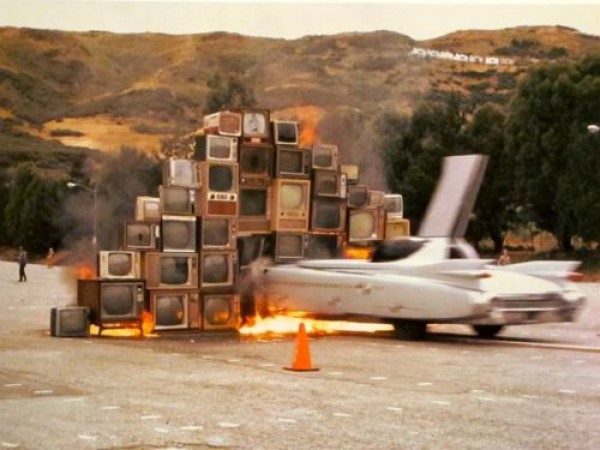Craft Notes
“Why would people sell themselves short and not just live the life of pure creative glamour.”
httpv://www.youtube.com/watch?v=lQ3SVpE9LTQ
On Friday night I read Dan Hoy’s post over at Montevidayo entitled THE PIN-UP STAKES: Poetry & The Marketing of Poetry. Approximately 2 hours later I was wasted in a bar across the street from my apartment, yelling at my roommate (who doesn’t really read poetry) that it was the best thing ever, insisting that she read it on her smart phone. About two hours after that I tweeted the phrase “If you take the lyrics to pop musick seriously they become the map of utopian society” (the “k” at the end of “musick” is my own superfluous nomenclature that surfaces mostly while “under the influence,” tying music to “magick” of course).
What was in my head, still, other than Hoy’s essay itself, was the video above, and more particularly, the song within the video.
httpv://www.youtube.com/watch?v=bw2o_Go4QWI
The lyrics, like a lot of pop-lyrics, perhaps seems shallow on the surface:
I’ve never seen you look like this without a reason,
Another promise fallen through, another season passes by you.
I never took the smile away from anybody’s face,
And that’s a desperate way to look for someone who is still a child.CHORUS:
And in a big country, dreams stay with you,
Like a lover’s voice, fires the mountainside..
Stay alive..(I thought that pain and truth were things that really mattered
But you can’t stay here with every single hope you had shattered)I’m not expecting to grow flowers in the desert,
But I can live and breathe and see the sun in wintertime..CHORUS [x2]
So take that look out of here, it doesn’t fit you.
Because it’s happened doesn’t mean you’ve been discarded.
Pull up your head off the floor, come up screaming.
Cry out for everything you ever might have wanted.
I thought that pain and truth were things that really mattered
But you can’t stay here with every single hope you had shattered.I’m not expecting to grow flowers in the desert,
But I can live and breathe and see the sun in wintertime..CHORUS [x3]

Now let us consider Hoy’s essay. To be honest, I’m going to mostly ignore the marketing part of the essay, as that’s not what specifically interests me at the moment. But, to introduce what I want to arrive at, eventually, let’s look at Hoy’s examination of the image artist:
The image artist is always speaking to something universal in all of us, and either we listen or we don’t. Regardless, the task of the image artist is to contaminate the world with her vision, or, in marketing speak, to construct a strategic framework and tactical deployment plan that will achieve the objective.
Image artists often have an ambivalent relationship with results. This is because results, whether quantitative or qualitative, act as positive or negative feedback within an image matrix, and thereby impact the image itself. Although the objective is unwavering, the method of achieving this objective is always open to review. An image artist might adjust strategic direction, or abandon an entire communication channel, based on results.

In the comments to the post, Hoy cites both Tao Lin & Lady Gaga as examples of image artists– “The image artist, as a role, is ideologically neutral – it’s filled with the ideology of whatever is filling it, and its goal is to contaminate the external world with its image, whatever that is. ” What we have established here is the almost ubiquitous “super star,” mostly devoid of meaning, hyper-present in an image saturated world (little more than an image her/himself), a master of social media and marketing. What the image artist is is a mode. The image artist is “rich and famous,” but, and while they have just now really gained enormous presence, they are–in terms of theory–the product of the past. Everybody already read Baudrillard in the 90s. Every stoner in the world saw The Matrix. The image artist is basically a simulacrum, we all know what that means, there’s not really anything to talk about.
We could talk about how it was inevitable, but that’s not progressive. We all knew this. All that has happened is that something that was bound to happen has happened. It’s not a terrible thing because we were ready for it, it can even be appreciated on some level, but it’s certainly not anything to get excited about. I’m sort of intentionally smudging Hoy’s ideas of the image artist at this point, particularly regarding, for example, Tao Lin, but that’s not really my point. This is just introduction.
As I’ve mentioned, I’m more concerned with the titular Pin-Up Stakes. However, before we move on to the second half of Hoy’s essay, let’s segue into Alan Stewart Carl’s meditation on ‘writing as a white, [straight, I assume] middle-class male’. As Roxane has already pointed out, Carl handles his response admirably, eventually landing on the idea that “the best fiction, no matter its topic or the life experiences of its author, takes you into the unique life of an ‘other,’ a life that in some way broadens your own understanding of the world, that brings illumination to places previously darkened.”
My initial response is: fuck that.
Actually that’s not really even just my initial response.

“But what’s the problem with that, M Kitchell? Seems like a pretty sound way to approach writing!”
The main problem is this: I have little interest in being “[taken] into the unique life of an ‘other'” in a way that “broadens [my] own understanding of the world.” Do you want to know why? Because I’m tired of the world. Fuck this world. This world is shitty and overrun by capitalism and bigots and genocide– if there’s anything we should all be able to agree on after the 20th century it’s that the world is TOTALLY FUCKED.
I don’t read things to help me understand the world, I already “understand” the world– it sucks (yes, this is incredibly reductive, I’m not a total idiot). I read things because I want to feel an entirely fucking new world, new life. When I released Dan Hoy’s Omegachurch on Solar▲Luxuriance, perhaps my favorite line from the entire work was the line on the back: THE WORLD IS THE END OF THE WORLD. This is a sentiment similar to that in the Pin-Up Stakes video posted above: EVERYBODY IN THE FUTURE / NEEDS TO DIE.
These words, sentences, phrases: they’re not negative. Not when understood within the context of the pin-up artist.
In Roxane’s latest post, “I Know Not of War”, she brings up and quotes the editor of The Paris Review:
During a master tea at Yale this past fall, Lorin Stein, editor of The Paris Review, discussed the state of literature with the students in his audience. He said he is looking for “stories and poems that resonate because they are about real life,” adding that “young writers do not have enough life experience to tackle the important themes that only fiction can illuminate, so they write about writing instead.”
As to the first part, “stories and poems that resonate because they are about real life”: This is the past. Real life is boring. Real life is riddled with everything terrible. As to the second part, “young writers do not have enough life experience to tackle the important themes that only fiction can illuminate”: This is just fucked. Age has very little to do with what you can write about. I could, potentially, agree with this if the word “life” was stricken from the phrase “life experience” and replaced with “writing experience.” We can make the easy claim that a 17 year old who grew up “on the streets” has had more “life experience” than a petit-bourgeois in middle management who has never left his hometown. This seems so incredibly obvious to me that I can’t believe I’m even bothering to type this out: you do not turn 35 and suddenly win a medal that awards you “life experience.” This is agist as hell. Of course there are 18-year-olds who think they “know it all,” there are also 45-year-olds who think they “know it all.” Nobody knows it all. Nobody has some quantative amount of “life experience” that instantly allows them to “be a good writer.”
But ultimately, experience isn’t even that important. I can figure out if I’m going to enjoy a movie or not based on the first 15 minutes. I have figured out that “this life” or “this world” is “mostly pretty dumb” despite only being in my mid-20s. I don’t need to waste 25 more years “gaining life experience” (what is this, a table-top RPG?) to figure that out.
And this is where the pin-up artist comes in.
The pin-up artist is, ostensibly, a diversion from the image artist. As Hoy says, “I do want to define a particular type [of artists/image artists] who share a common objective: to end the world and change life.” He follows this up, “I should clarify that when I say ‘end the world’ I’m not suggesting a kind of artistic terrorism or terrestrial apocalypse. By ‘life’ I mean the form of nothingness we experience, and by ‘world’ I mean the structure in which we navigate and make meaning out of this form of nothingness.” But, instead of the image artist who has simply, basically, mastered marketing, the pin-up artist wants to master the world, which, in Hoy’s exegesis, is simply another tool.
I’m positing it here instead as the foundation of human reality: life itself is the first mediating factor, or image, of nothingness, and the world is what mediates the mediation. The world is made in the image of the image.
Arguably it is here that we come back to marketing, and it is specifically at this point, I feel, that the problem of privilege and class can arise, as Jackie Wang points out to Dan in the comments section. However, this isn’t the end of the pin-up artist. While we must recognize that the technological resources that enable the image artist are not available to everyone in the entire world, we can consider the fact that using technological resources to publish and disseminate the work of an image artist/pin-up artist does instantly enable you to reach a larger audience than, for example, a published poem within a printed lit magazine (note that I say “enables” not “guarantees”).
And with this power the idea is, perhaps, not to end the entire world at once, but perhaps at least to end the world that you currently inhabit. And since anyone who is reading this blog post, and since anyone who is exposed to the image artist is clearly accessing a computer, said individual is, at least to an extent, privileged above those who do not have access to computers. And it is this demographic, this world of those-with-computer-access, that the pin-up artist will bring to an end. And then the world as a whole can end.
And it is here that things become fascinating, because it is here that we encounter the impossible.

This is all to say that the pin-up stakes are defined by a subjective rather than material objective (though it may have material effects), and it is precisely this tension between life and the world that the pin-up artist exploits: the nexus of the first image (life) with the second (world). The greater the tension, the greater the cataclysm when this tension is antagonized, and the greater the probability that a linear conjunction of world-life-nothingness will be knocked loose and repositioned into a triangulation, with the artist and audience communing at the very center of it. This center is the experience of the end of the world, or rather, the end of the dominating proximity of the world. The position of life is changed. From this space, in equal proximity to nothingness, its image, and the image of its image, reality is no longer limited by what is possible. The impossibility of existence itself is experienced first hand, whether as a rapturous, uncanny joy, or terror, or trauma, or profound boredom, or as a kind of pure occurrence, void of affect. The exact contours of the experience are incidental: no specific feeling is sutured to the specifics of what happens. What we’re talking about is the point at which meaning collapses into infinitude. If we were to locate this vision politically, it would be the moment of revolt, inside the event, where all rules of particularity are annihilated. If we were to locate it personally, it’s the experience of right now as it really happens, tethered to but undetermined by the factual chronology of our lives.
(bolded text bolded by me)
In his somme atheologique, Bataille lays out and develops his ideas of the summit, as well as that of the impossible. The most difficult part of Bataille is that the concepts he spends most of his time engaging with are concepts of non-knowledge, concepts that are formless, inexpressible with language. This is simultaneously their “point” and the reason that Bataille ended up writing as much as he did. Bataille’s conception of the impossible is where meaning collapses into infinitude: it is Foucault’s heterotopia, the Situationist’s dérive, Hakim Bey’s fucking temporary autonomous zone. But it’s, simultaneously, none of these. It’s the summit of existence, it’s the future in the present, it’s fucking spirituality, perhaps it’s what some people call god. But it denies all of this too.
I’m getting, perhaps, muddled here; I need to get back on track.
The pin-up artist is done with the world. They are above it. You could say that their writing is the future, but it’s not. It’s the present. The pin-up artist wants you to see that. The pin-up stakes are “an open challenge to those who have the capacity to live like immortals yet choose to live for the world.” And this is happening in poetry. This is happening in fiction. This is what I mean when I saw that art should be political. I do not mean that fiction should be boring, representational hum-drum demonstrating why the patriarchy is bad (or whatever); fiction should not be representing anything, fiction should be, in this particular example, anti-patriarchy without having to represent anti-patriarchy. Instead of writing about why the patriarchy should be taken down, write in the world where the patriarchy doesn’t exist.


Okay, instead of fragmenting off into infinity, as I am often prone to doing, let’s revisit a few lines of the Big Country song I posted earlier:
(I thought that pain and truth were things that really mattered
But you can’t stay here with every single hope you had shattered)
When I rail against “realism” and the “traditional mode of writing” this is what I mean: if you are finding yourself constantly beaten down working within the system that is beating you down, why are you staying within the system? You can write straight forward narratives outside of the system of a canon-driven realm of literature. You can destroy the world.
Dan Hoy ends his essay with the following:
The goal here is not to make fools look like fools, but to risk looking like a fool in order to raise the stakes. There can be no revolution without risk. This is not to say that the pin-up artist is a revolutionary. There is no concrete objective she is striving toward, only the vision she already inhabits and offers up to us. But it is precisely this vision of the impossibility of existence that enables the possibility for change. Either you believe in it or you don’t believe at all. To the pin-up artist, these are the highest stakes. What happens next is up to us.
This strikes me as a call to arms, and I’m ready to grab my fucking pen and kill everything.

Tags: Dan Hoy, georges bataille, Jon Leon, the impossible

Totally badass post. also, Big Country rules
I’m going to agree. Thoughtful, badass post. Going to chew on this one a bit.
Great post, Mike. I have been interested in Dan Hoy’s manifesto for a long time. What is interesting to me about his ideas is the idea that, as an artist, you might not have to be in the world at all. It’s like the artist has reached the ultimate stage of evolution, and look back and see everything, and see’s the present as if its in the past, because he is hte future. It’s like the whole history of art is converging on a single point, the point of being really cool and writing a manifesto. I agree that the world is very bad and stupid and as artists we should not be in it any more. And it’s interesting that stuff like facebook and having an iphone lets us to do that…. to replace the very world itself. Of course, not everyone in the world has a facebook and iphone. That’s the stupid cirticism that every single person makes, WE KNOW THAT, but the point is that the artist is ABOVE everyone so of COURSE we have an iphone. I reallly appreciate all your ideas about destroying the world, I ikmagine the artist as a big dick in the sky, cumming all over the world to destroy it. Also, I love your idea about “Instead of writing about why the patriarchy should be taken down, write in the world where the patriarchy doesn’t exist.” (I cosider myelf a feminist.) I think this is a really great idea, because if your just trying to write something that has somethig to do with anything or has any meaning or content, what’s going to stop it from being reappropriated? But obviously if you’re writing something that’s just marketing, that’s totally the way to avoid recreatig capitalism. I imagine the artist creating a pristine, pure, white little bubble, free from any outside influences, where we can all live in the ultimate world of your dreams where nothing bad could ever happen. Since we are creating something that has nothing to do with anything, obviously there is no chance that we could ever, ever recreate the conditions we were trying to escape. In conclusion, great post, love the ideas. I, myself, share them.
This made me want to write. Seriously, I love this kind of shit.
I do wonder (as the originator of the line that gets blown up) what do you think is the real difference between “takes you into the unique life of an ‘other,’ a life that in some way broadens your own understanding of the world” and “There is no concrete objective she is striving toward, only the vision she already inhabits and offers up to us. But it is precisely this vision of the impossibility of existence that enables the possibility for change.”
I mean, other than one sounds dry and common and one sounds explosive. The point being: if it can exist, then it must exist within the world no matter how we frame it. Sure there’s the world in the definition of “reality,” then there’s the world in the definition of everything/anything that can ever possibly be. If we, as artists, are capable of blasting apart the current realities with our words/imagery, are we not broadening people’s understanding of what the world can be? Or … and here’s the crux of this question … is audience important only in the sense that audience is necessary for performance to be performance? Artistic objective being what artistic objective is (or isn’t), should we much care about any of this construction? Or is it enough to just push ourselves out there and let it cut in whatever way it cuts? I feel like I need to have a drink to do this conversation right.
Age-ism, my ass. You’re like the white racists who scream “reverse racism.” When you are 25 years older, you can let your older selves explain it all to your arrogant, ignorant younger selves.
wait, seriously? jesus christ. i’m too drunk to reply to any comments other than this one because my life is awesome.
YEAH OKAY COOL I’LL GET BACK TO YOU IN 25 YEARS
Yes. Dan Hoy is trying to transmute Alain Badiou into Georges Bataille–a very dangerous alchemy which leads me to believe that Hoy doesn’t particularly “get” the politics of either. Because this type of “nothing is everything” writing is pure ideology (it’s literature’s becoming Hollywood, which is as vain as it is “impossible”)–and it’s simply old territory for literature, and especially for global capital. The image artist negates nothing but the political import of writing. Not to say that “realism” as such is any sort of solution.
<3
world I have to break up with you now world
http://jerseyshorepoem.blogspot.com/2010/08/break-up.html
Ah, but Hoy differentiates between the image artist and the pin-up artist, as he explains them. He even suggests that the image artist is essentially useless.
Also, I suppose it’s worth pointing out that I messaged Hoy before writing this to ask about any Bataille connection, and he said he wasn’t specifically thinking of Bataille when he wrote his ‘manifesto.’ So that’s my addition, I suppose. I haven’t read Badiou, though I think that’s Hoy’s steez for sure.
Also, I find it strange that you imply Hoy ‘doesn’t particularly ‘get’ the politics of either.’ I’m comfortable saying that, politically, he’s certainly in line with Bataille, and I feel like I could even probably back that up with textual reference if chided to do so.
making a yolk without scrambling an egg
i think the difference, at least in my reading, is that the first implies a sort of empathy: like, here is another person, i will reveal her to you so you can feel empathy, this empathy will allow you to “relate” and thusly fulfill the bourgeois expectation of art. the second is saying: the real world offers nothing, and because this is impossible one cannot form a relationship to the work via empathy, and thus the issue of ‘relatability’ is moot.
hoy’s follow up post on montevidayo, a case study of jon leon, deals further with the issue of audience.
Do we ever consider, and this may be a little jaded, that we place too much weight on intent / affect / effect ? It’s like, sometimes (wo)man, criticism and writing-on-writing and writing-on-art is kind of like big eco-festivals, the ones with bands and amplifiers powered by solar panels and shit farming the port-au-potty. So we can frame what we do to ‘feel good’ or feel like we’re a part of a ‘movement’ or just ‘feel’. But really, it’s just another excuse to fuck in the forest and get wasted because regular life, the fairly transparent and corrupt systems that govern it, and its effects on our interpersonal relationships, is a fuck (Why else would I be talking here on the internet, ladeeda). Sometimes you’ve got to fuck to get out of the fuck. And fucking in the name of reduction and escape from reproduction and reality is what it’s all about. Great literature is sexy as hell. It’s like a clit in your brain, the tip of the penis in your ear hole. After a good book, like great sex, you feel all tired, and all you want is a burrito or a cigarette or a nap. It’s like, yeah, that was a book we just pumped out in that bed. But when a book rubs you like sex, you aren’t as tired as real sex. That’s why it’s artifice. I rarely want a burrito after a good poem. I do, however, want sex. What am I talking about? Right: So art is the sexual impression (revolution impression) that takes place either in present sex (revolution) or future sex (revolution), and if it’s historical, it’s geriatric sex (nostalgia). If you are making it, it’s like having sex with yourself… while thinking about or watching other people. You sit in front of this screen for an incomprehensible amount of time… and when you’re finished… you feel disgusted, with the world, with the flesh, with yourself. You don’t want a burrito. You don’t want real sex. You want something completely camp, like Kanye West’s Runaway.
This is interesting, Alec. You may be correct about the dangerous alchemy, but I’m not sure if this is in reply to my original post or Mike’s rendering of it (which I like a lot, though I don’t agree 100% with it). The slogan may be “end the world and change life”, but if you read the original post it elaborates that this is about proximity: end the dominating proximity of the world and change the position of life. The pin-up artist is really focused on a continual subjective reorientation, like a centrifuge that spins world/life/nothingness in order to maintain an equidistant relationship and not let one dominate the others. Too much nothingness, for example, and you fall into the territory where zen is a perfect facilitator for capitalism. The risk is that in order to catalyze this reorientation, you have to knock loose the world, since it by default is closest in proximity in what I feel is a linear conjunction. This requires a deft yet nebulous antagonism, but ultimately I would describe our relation to the world, as what mediates our relation to life (which mediates our relation to nothingness), as ambivalent rather than straight up antagonistic. The difficulty in identifying the demarcation between resistance and complicity is also key. It may be that what is a form of resistance one second is suddenly a form of complicity the next. That is why I try to emphasize a process of strategic and tactical adjustment that is oriented around an unwavering objective. The risk here is high, but I feel you have to risk a catastrophic fuck-up that leads to something truly awful. It’s similar to the argument of capitalism as a “least bad” solution that is preferable to risking a repeat of the failures of 20th century communism. I feel this argument is defeatist and dependent on an acceptance of a system predicated on pockets of localized suffering. You could argue that this is precisely what the universe is, so why argue against a similar model, shouldn’t we just work with this and try to mitigate the effects? I understand this argument. But who wants to volunteer to be among the suffering?
um, another fake deadgod here…. let’s get real, people….
Interesting. I’ve never thought art needs much to do with empathy. “Relating” to a work seems unnescessary to being altered by a work. But I get the distinction. God knows the “make your characters relatable” advice is one of the first things a budding writer hears. But it seems to me that the greatest artists have always gone against simply providing ways for a person to “relate.” The moment you care too much about audience is the moment you start making compromises in your vision. Easier said, of course.
yeah, like fuck society mannnn.
not true, colostomy baggage
As opposed to not 20th century communism…
Those of us not facing the blunt edge of capitalism certainly won’t volunteer to be among the suffering! We will leave that for the slaves in the maquiladoras, and those who starve so we can live in our I-phone laden decadence.
xrl.us/bh8nzm
it is currently the 21st century, communism is still a structured idea, yet it differs in it’s current conception than it did in the 20th century hence….
“Time is on the side of capitalism, capitalism is everything that makes me sad, so time must be evil”
possibly more or less said by Nick Land
hello superfluous apostrophe in its
why do i appear to have like 9 different disqus accounts
Calling oneself communist does not a communist make.
[…] replies I made in the comments field of the original post, as well as in the comments field to Mike Kitchell’s post about The Pin-Up Stakes on HTML Giant – thanks especially to Jackie Wang for her […]
Instead, I went through every recipe book in the library looking for pickles. I tried dozens of recipes, but never came close to the old man’s formula.
[…] you’ve come this far, you’re probably wondering what any of this has to do with my formerly established ideas that I’ve nurtured via Dan Hoy’s writings on The Pin-Up Artist, especially in contrast […]